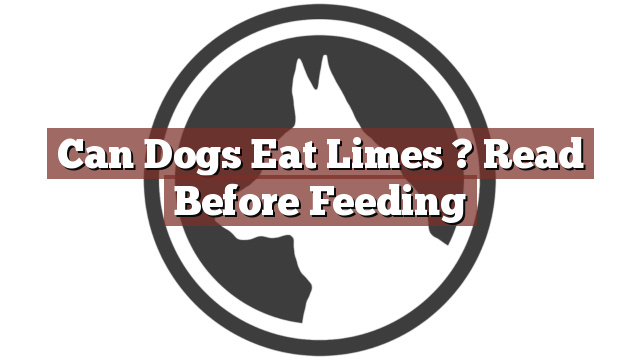Understanding Your Dog’s Dietary Needs
As pet owners, it is our responsibility to ensure that our dogs have a balanced and healthy diet. Understanding your dog’s dietary needs is essential in providing them with the right nutrition to thrive. While dogs are primarily carnivores, they can also benefit from certain fruits and vegetables in moderation. However, it is crucial to remember that not all human foods are safe for dogs, and some can even be toxic. It is always best to do thorough research before introducing any new food into your dog’s diet.
Can Dogs Eat Limes? Read Before Feeding
Can dogs eat limes? This is a question that many dog owners may have when considering adding citrus fruits to their pet’s diet. The answer is no, dogs should not eat limes. Limes, along with other citrus fruits like lemons and oranges, contain citric acid and essential oils that can be harmful to dogs. While small amounts of citrus fruits may not cause severe issues, it is best to avoid feeding them to your furry friend altogether.
Citrus fruits like limes can cause stomach upset in dogs. The high acidity of the fruit can lead to gastrointestinal issues such as vomiting and diarrhea. In some cases, it may even cause an upset stomach or pancreatitis, which can be a serious condition requiring veterinary care. The essential oils found in limes can also cause irritation to a dog’s skin and mucous membranes.
Pros and Cons of Feeding Limes to Dogs
While it is clear that limes are not suitable for dogs to consume, let’s take a closer look at the pros and cons of feeding limes to dogs.
Pros:
- Limes are a good source of vitamin C, which is beneficial for humans. However, dogs naturally produce their own vitamin C, so it is not necessary to supplement their diet with citrus fruits.
- Some dog owners may believe that the citrus scent of limes acts as a natural flea repellent. However, there is no scientific evidence to support this claim, and it is not a reliable method for flea prevention.
Cons:
- The high acidity of limes can cause digestive issues in dogs, leading to vomiting, diarrhea, or even pancreatitis.
- The essential oils in limes can be toxic to dogs and may cause skin irritation or other allergic reactions.
- Limes can pose a choking hazard due to their small size and round shape.
In Conclusion: Assess Your Dog’s Individual Needs Before Introducing Limes
In conclusion, it is best to avoid feeding limes to your dog. While the small amount of lime in a meal or accidentally ingesting a small piece may not cause severe harm, it is safer to eliminate limes from your dog’s diet altogether. If you are looking to introduce new fruits or vegetables into your dog’s diet, consult with your veterinarian to ensure they are safe and appropriate for your furry friend. Remember, each dog is unique, and their dietary needs may vary, so it is essential to assess your dog’s individual needs before making any changes to their diet.
Thank you for taking the time to read through our exploration of [page_title]. As every dog lover knows, our furry friends have unique dietary needs and responses, often varying from one canine to another. This is why it's paramount to approach any changes in their diet with caution and knowledge.
Before introducing any new treats or making alterations to your dog's diet based on our insights, it's crucial to consult with a veterinarian about [page_title]. Their expertise ensures that the choices you make are well-suited to your particular pet's health and well-being.
Even seemingly harmless foods can sometimes lead to allergic reactions or digestive issues, which is why monitoring your dog after introducing any new food item is essential.
The content provided here on [page_title] is crafted with care, thorough research, and a genuine love for dogs. Nevertheless, it serves as a general guideline and should not be considered a substitute for professional veterinary advice.
Always prioritize the expert insights of your veterinarian, and remember that the health and happiness of your furry companion come first.
May your journey with your pet continue to be filled with joy, love, and safe culinary adventures. Happy reading, and even happier snacking for your canine friend!

